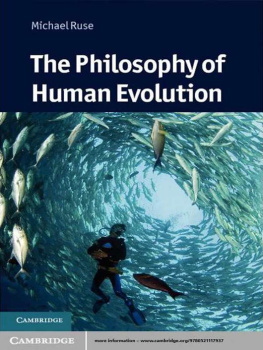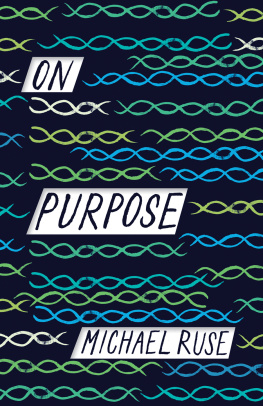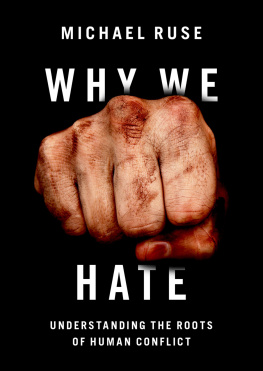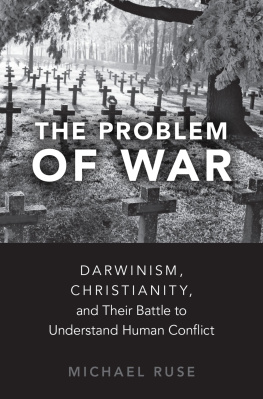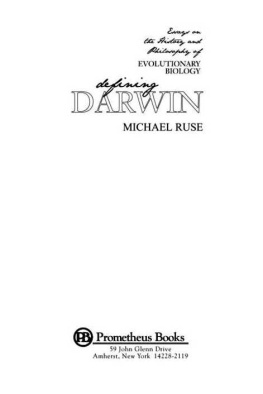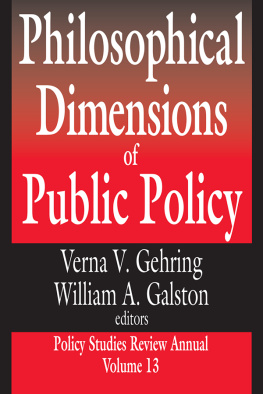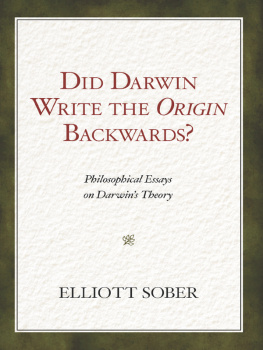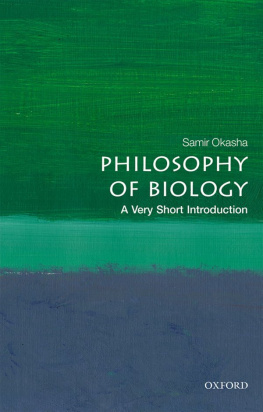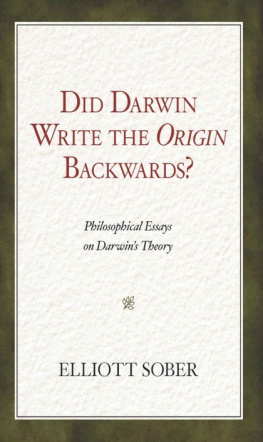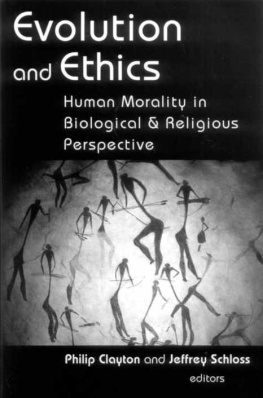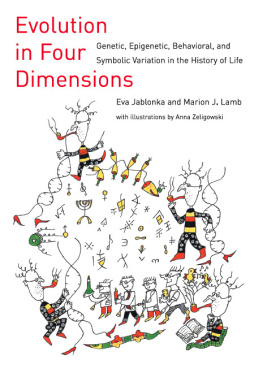The Philosophy of Human Evolution
This book provides a unique discussion of human evolution from a philosophical viewpoint, looking at the facts and interpretations since Charles Darwins The Descent of Man . Michael Ruse explores such topics as the nature of scientific theories, the relationships between culture and biology, the problem of progress, and the extent to which evolutionary issues pose problems for religious beliefs. He identifies these issues, highlighting the problems for morality in a world governed by natural selection. By taking a philosophical viewpoint, the full ethical and moral dimensions of human evolution are examined. This book engages the reader in a thorough discussion of the issues, appealing to students in philosophy, biology, and anthropology.
Michael Ruse is the Lucyle T. Werkmeister Professor of Philosophy and the Director of the Program in the History and Philosophy of Science at Florida State University. His previous publications include Can a Darwinian Be a Christian? The Relationship between Science and Religion (Cambridge, 2004), Darwinism and Its Discontents (Cambridge, 2008), and Science and Spirituality: Making Room for Faith in an Age of Science (Cambridge, 2010).
Cambridge Introductions to Philosophy and Biology
General editor
Michael Ruse
Florida State University
Associate editor
Denis Walsh
University of Toronto
Other titles in the series Derek Turner , Paleontology: A Philosophical Introduction
R. Paul Thompson , Agro-Technology: A Philosophical Introduction
Michael Ruse , The Philosophy of Human Evolution
The Philosophy of Human Evolution
Michael Ruse
Florida State University
CAMBRIDGE UNIVERSITY PRESS
Cambridge, New York, Melbourne, Madrid, Cape Town, Singapore, So Paulo, Delhi, Tokyo, Mexico City
Cambridge University Press
The Edinburgh Building, Cambridge CB2 8RU, UK
Published in the United States of America by Cambridge University Press, New York
www.cambridge.org
Information on this title: www.cambridge.org/9780521117937
Michael Ruse 2012
This publication is in copyright. Subject to statutory exception and to the provisions of relevant collective licensing agreements, no reproduction of any part may take place without the written permission of Cambridge University Press.
First published 2012
Printed in the United Kingdom at the University Press, Cambridge
A catalogue record for this publication is available from the British Library
Library of Congress Cataloguing in Publication data
Ruse, Michael.
The philosophy of human evolution / Michael Ruse.
p. cm. (Cambridge introductions to philosophy and biology)
Includes bibliographical references and index.
ISBN 978-0-521-11793-7 (hardback) ISBN 978-0-521-13372-2 (paperback)
1. Human evolution Philosophy. 2. Human evolution Social aspects. I. Title.
GN281.R84 2012
599.938dc23
2011039357
ISBN 978-0-521-11793-7 Hardback
ISBN 978-0-521-13372-2 Paperback
Cambridge University Press has no responsibility for the persistence or accuracy of URLs for external or third-party internet websites referred to in this publication, and does not guarantee that any content on such websites is, or will remain, accurate or appropriate.
For Francisco Ayala
Contents
Figures
Acknowledgements
No book is written in isolation, certainly not this one. As you will see on every page, it was Charles Darwin and his wonderful theory of evolution through natural selection that made possible all interesting inquiry about human origins and their implications. More immediately, for detailed knowledge about human evolution I am much in the debt of my colleague, the paleoanthropologist Dean Falk. Her wisdom and friendship are very much appreciated. As always, my thinking has been shaped in many ways by the interaction with three people: the philosopher David Hull, the historian and philosopher Robert J. Richards, and the biologist Edward O. Wilson. The paleontologist Daniel McShea has long stimulated my interest in the question of progress in evolution, and I owe much to Randolph Nesse for his pioneering thinking about evolutionary medicine.
Hilary Gaskin at Cambridge University Press was supportive as always, and the co-editor of the series to which this book belongs, Denis Walsh, gave the manuscript a thoughtful reading. I am tremendously in debt to my wife Lizzie for everything. Finally, I want say what pleasure my dedication gives to me. I have known Francisco J. Ayala for over thirty years, admired his work, and enjoyed his friendship. Above all, I respect the time and effort he has given to the well-being of science, whether it be on the witness stand critiquing Creationism, taking leadership roles in leading organizations and academies, or welcoming people from the world over to his laboratory. I doubt whether he will agree with everything I have said in this book, but I can say that without the work of people like him such a book could not have been written.
Evolutionary biology
What is evolution? If you were asking in the middle of the eighteenth century, the answer would be something to do with individual development. But from about the middle of the nineteenth century the term has meant a gradual process of law-bound development that brought about the world in which we live, especially the world of organisms, animals, and plants (Richards ). We usually add that we mean a natural process, that is something where supernatural forces like God play no direct role. Often we mean common ancestry, a tree of life, although not every evolutionist has believed in such a tree. Today we think more in terms of bushes or sometimes perhaps a very odd tree like the banyan tree, where there are links all over the place.
Early years
The ancient Greeks did not believe in evolution (Sedley require an intelligence of some kind to make them. Hence, evolution the epitome of blind chance is impossible.
The coming of Christianity reinforced this mind-set. The early Christians were not at first sure that they needed to accept the Hebrew Scriptures after all, it was the Jews who rejected Jesus. But, particularly under the influence of St. Augustine (354430 CE), they realized that it is only through the Jewish narratives that sense can be made of Jesus and his fate. Why did he have to die on the cross? For our sins. Why are we sinful? Because of the acts of Adam and Eve, as told to us in Genesis. Augustine particularly cautioned that one should not necessarily interpret Scripture literally, especially if it conflicts with modern science. But then, and for many centuries later, no one had reason to doubt the authenticity of the Genesis creation story, which puts all down to miracle, not that long ago.
It was only at the beginning of the Enlightenment, the flowering of science and philosophy that is generally dated from the beginning of the eighteenth century, that people first started to speculate seriously in the direction of developmental origins (Ruse a). It is true that increasingly there were empirical discoveries that today we would think evidence of evolution fossils and strange transitional creatures, particularly but then and for many years afterwards the chief attraction of evolution was ideological. The Enlightenment was the time when many people first began seriously to adopt the philosophy of Progress the belief that through unaided human talent and effort the human condition, science, medicine, teaching, culture, and more, can be improved. The Enlightenment was the time when many people began to reject the older philosophy of Providence the belief that we humans unaided can do nothing without Gods help and to think otherwise is presumptuous and doomed to disaster. Evolution now, without qualification, meaning the evolution of organisms was caught up in this debate about Progress and Providence, with supporters of the former arguing that as we see Progress in the cultural world, so likewise we see progress in the biological world, going all of the way from blobs to humans, from monads to man as the saying went. (Progress with a capital P will refer to cultural notions of upward change; progress with a small p to biological notions of such change.)

